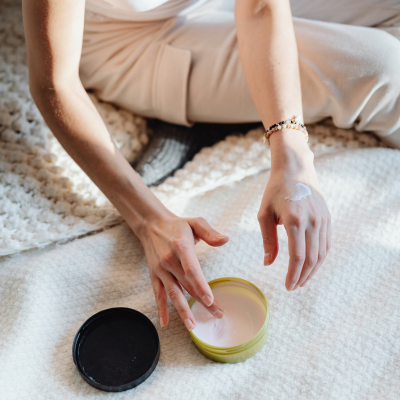You may think these five things are helping but they may actually be making intrusive thoughts worse…
If you’re a mom having questions about intrusive thoughts, you’ve definitely come to the right place. Our brains work in really strange ways and when you become a mom, that’s even more true. Taking care of a baby or being on guard for the safety of young children can heighten anxiety. It makes your mind extra aware of potential threats—sometimes even before they even arise in real life.
If you’re only vaguely familiar, intrusive thoughts for mothers are the scary ideas, disturbing images, or upsetting “what ifs” that pop into your head unwelcome and unannounced. And they’re called intrusive because they’re contrary to what you would actually want to happen in reality. It’s like a mini nightmare that happens while you’re awake.
For example, you may think for a split second about jumping off a balcony, pushing your child down the stairs, or about someone attacking you.You don’t want these things to happen… but your mind went there anyway.


Intrusive thoughts can feel so uncomfortable but they are part of the reality of becoming a parent. (Even if your circle of mom friends isn’t talking about it.) The most common intrusive thoughts fall into common categories like: imagining your child getting hurt; fears surrounding health; scenarios involving sexual abuse; thoughts about violence; and anxiety about healthy attachment/relationships with members of your family. But really, intrusive thoughts can be about anything! Your mind is endlessly creative.
Even though you may now understand that intrusive thoughts for mothers are common, you may still struggle with knowing how to handle them. The question to ask yourself here is: How are these thoughts impacting my life? (And if they are, a good starting place for you is to try these four ways to ease intrusive thinking.)
Some mothers may notice these thoughts, feel worried or upset, but ultimately move on.
Others may get sucked in by them, giving them power and feeding the anxiety further. That’s what I’m talking about here—the mistakes that make intrusive thoughts worse. Below are the five most common. Recognize yourself in any of these?
Mistake #1: Ruminating
If you suffer from anxiety, you may be all too familiar with patterns around ruminating. This is when you get stuck on a thought or problem and you just can’t stop thinking about it. You go over it again and again. You may replay a conversation or memory in your mind on repeat. Or you may try to problem solve by thinking through every aspect of an issue from every angle possible.
Maybe you have an intrusive thought and instead of simply allowing it to pass, you fixate on why it happened in the first place. The point is that you’re stuck thinking or talking in circles. You never actually make progress on solving or stopping the intrusive thought. Instead you’re just obsessing over it.
How it shows up:
“Why would I think about that?”
“Is there something about myself that I don’t know?”
“Am I actually a monster/a bad mom/weird?”
“What’s the difference between me and the person who actually acts on that thought?”
“I know I’m supposed to be sleeping but I need to review that scenario one more time to make sure I wasn’t in the wrong.”
Mistake #2: Seeking reassurance
This may seem self explanatory until you realize all the different ways you may be seeking reassurance from the intrusive thoughts that are putting a damper on your mental health. Do you need to check in with your partner constantly to confirm that your fear isn’t actually realistic? Do you research things like health symptoms or the probability of dying in a car crash… despite knowing that you already Googled that last week?
How it shows up:
“I know I just looked up symptoms for X but I’m going to check Google one more time.”
“I’m going to confirm with my partner again that everything is ok about this situation that’s worrying me.”
“I know I went over this with my therapist already but I’m going to bring this to the next session anyway.”
“I’m going to put up a second baby gate. It’ll give me peace of mind and you can never be too sure.”
“I just talked to my best friend about this but I didn’t tell her about that detail. I’ll text her to see what she thinks again.”
Mistake #3: Avoiding
How are your intrusive thoughts impacting your daily life? Have you started changing your behaviour in any way? Are there certain activities you now avoid to decrease the chances of your intrusive thoughts coming true? Are there places you avoid? What about areas of your own home that you stay away from? Avoidance may feel helpful (I.e. if I don’t do the thing I’m scared of, the intrusive thought can’t become a reality!). The thing is, avoiding certain things that otherwise would be part of your normal life is making adjustments to accommodate your intrusive thoughts. You’re giving them power which is a big mistake.
How it shows up:
“I have this specific fear around diaper changes or bath time. I’m just going to get my partner to do it.”
“There’s so many illnesses and accidents dominating headlines. I’m just going to stay home. It’s safer.”
“I have a fear about intruders or attackers. It’s better if I don’t go outside at night.”
“I’m not sure if I’m bonding with my child. It’s better if my partner plays that game with her—I make it less fun.”
Mistake #4: Suffering in silence
Shame is a really common emotion that comes up while experiencing intrusive thoughts in motherhood. Sure, you may feel uncomfortable or weirded out by some of the things your imagination comes up with… but suffering in silence only increases shame and your sense that something is wrong with you. You don’t have to get graphic, but you could try mentioning to a trusted friend something like: “Ever since having the baby, I have had all of these new fears about his/her safety.” Given how likely intrusive thoughts are for mothers, your friend may confirm that she’s going through the same thing.
How it shows up:
“It’s so weird that I think about these things. I’m not going to ask for advice from my friend because she’ll think I’m weird.”
“I’d talk to a therapist but what if she doesn’t get it?”
“I can even put words to what’s going on in my mind because I’m so ashamed.”
“I’d be mortified if any of my mom friends knew what crosses my mind sometimes. It’s definitely just me!”
Mistake #5: Pursuing certainty
Anxiety loves uncertainty. In fact, anxiety probably wouldn’t exist if you had confirmation that what worries you most would never happen. Imagine how great it would be to have a 100% guarantee that your children were never going to get in an accident and that they’d live a long, happy life. I mean, couldn’t you just take one big sigh of relief!? Sadly, that’s not how life works.
Uncertainty and not knowing is a part of life. We have to accept that things may not always go as expected (despite carefully made plans!). We also have to accept that there’s so many unknowns and that thinking about risks in no way enables you to control or prevent them. Even though uncertainty is a hard one to sit with (particularly when you have anxiety and aim to have control over situations), you might as well get on with enjoying your life.
How it shows up:
“I can’t handle the uncertainty around illnesses. Not knowing how, when or how severe illness will hit my kids is eating at me.”
“I’m always worried I’m doing the wrong thing. I wish I could confirm that I’m not causing damage.”
“I can’t possibly know if or when someone will break in and hurt us. If I could just have confirmation that it won’t happen, I could calm down!”
When you asked yourself, “How are my intrusive thoughts impacting my life?” did you feel that they are causing lots of stress or even changing the way you live entirely? This is one of those areas of anxiety that can really affect mental health and change how you function.
If you’re noticing that your thoughts are derailing parts of the day, that’s a major red flag. And friend, I’ve been there! Check out my free anxiety guide below!


















Comments +